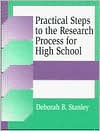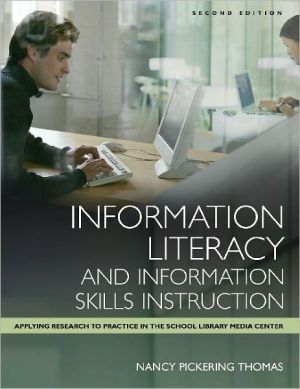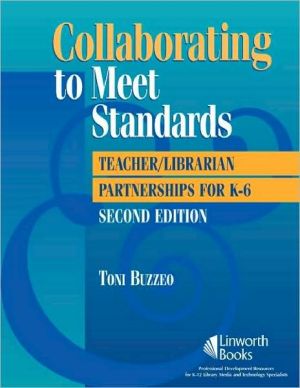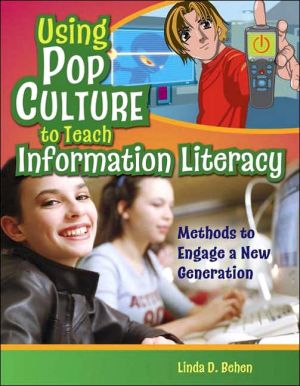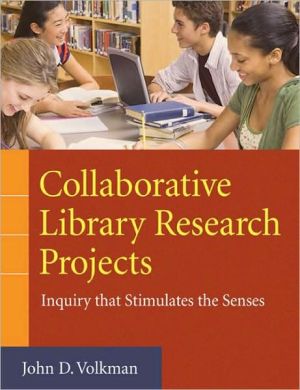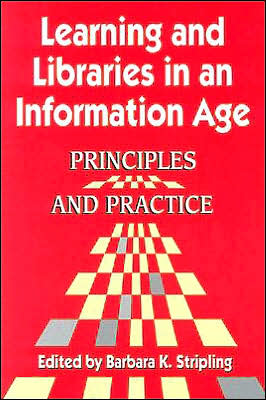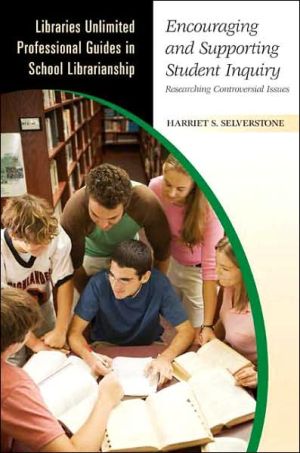Practical Steps to the Research Process for High School
These hands-on lessons for teaching the research process will help you effectively teach information skills, while implementing current national information literacy standards. Stanley offers strategies that connect standards to content area units of study, sharing dozens of successful collaboratively planned and taught research lessons. Detailed learning activities for each of the six research skills demonstrates how this process meets the needs of today's students as well as the...
Search in google:
These hands-on lessons for teaching the research process will help you effectively teach information skills, while implementing current national information literacy standards. Stanley offers strategies that connect standards to content area units of study, sharing dozens of successful collaboratively planned and taught research lessons. Detailed learning activities for each of the six research skills demonstrates how this process meets the needs of today's students as well as the requirements of many current educational trends and reforms-technology integration, literacy, critical thinking, collaborative instruction, and adaptations for second language learners as well as learning disabled students. The book includes guidelines for planning and preparing for research, scripted lessons with accompanying instructor directions, application and accountability procedures, and writing and technology extensions. KLIATT The heart of this book is a four-day diary of scripted research lessons based on authentic teaching experience. Stanley has not included any information about her qualifications or background, but a dedication indicates that she worked at Hanover High School in the Glendale Unified School District (CA) in 1997-1998. Charts and forms outline the practical series of lessons. These can be used as handouts or viewed on the overhead. To make these graphic aids truly useful, a CD-ROM could have been included so that they could be customized. The focus is on the use of sub-topics and note-taking as the "missing links" of the research process. The assumption is that a teacher will allow the librarian to take three days to teach the research process, which may be a hard sell in some settings. However, there are some very good practical suggestions regarding collaboration, creating sign-up calendars, and using multiple formats and sources. This is a good effort that will be useful for librarians looking for a way to integrate information literacy skills into the curriculum. 1999, Libraries Unltd, 230p, bibliog, index, 28cm, 99-050169, $29.00. Ages Adult. Reviewer: Rita M. Fontinha; Lib. Media Spec., Norwood H.S., Norwood, MA, September 2000 (Vol. 34 No. 5)
\ KLIATTThe heart of this book is a four-day diary of scripted research lessons based on authentic teaching experience. Stanley has not included any information about her qualifications or background, but a dedication indicates that she worked at Hanover High School in the Glendale Unified School District (CA) in 1997-1998. Charts and forms outline the practical series of lessons. These can be used as handouts or viewed on the overhead. To make these graphic aids truly useful, a CD-ROM could have been included so that they could be customized. The focus is on the use of sub-topics and note-taking as the "missing links" of the research process. The assumption is that a teacher will allow the librarian to take three days to teach the research process, which may be a hard sell in some settings. However, there are some very good practical suggestions regarding collaboration, creating sign-up calendars, and using multiple formats and sources. This is a good effort that will be useful for librarians looking for a way to integrate information literacy skills into the curriculum. 1999, Libraries Unltd, 230p, bibliog, index, 28cm, 99-050169, $29.00. Ages Adult. Reviewer: Rita M. Fontinha; Lib. Media Spec., Norwood H.S., Norwood, MA, September 2000 (Vol. 34 No. 5)\ \ \ \ \ School Library JournalAn accessible approach to the "how-to" of doing research, which is broken down into steps that include developing a topic and subtopics, note taking, and sorting notes. Stanley successfully melds theory with practice and addresses real problems faced by library media specialists. She also illustrates how, despite programming constraints, it is possible to get results that will ultimately benefit students in their research. The author correctly asserts that a necessary part of the process is letting teaching staff know what the library media specialist can do for them, thus encouraging more successful student writing and, ultimately, making the teaching process easier. She also notes some effective public-relations techniques to use to this end. The book includes templates and sample lesson plans for three days of instruction leading up to individual hands-on research, rough drafts, and finished creative projects.-Karen Patricia Smith, Queens College Graduate School of Library and Information Studies, Flushing, NY Copyright 2000 Cahners Business Information.\|\ \ \ BooknewsA library media teacher shows educators how to plan and prepare for teaching research, detailing every step of the process from finding and developing topics to creating and presenting the final research project. Includes abundant reproducible student handouts. Annotation c. Book News, Inc., Portland, OR (booknews.com)\ \
